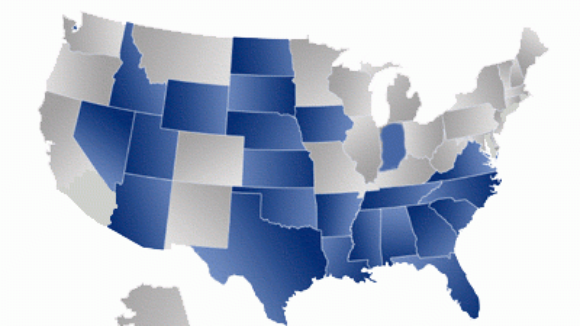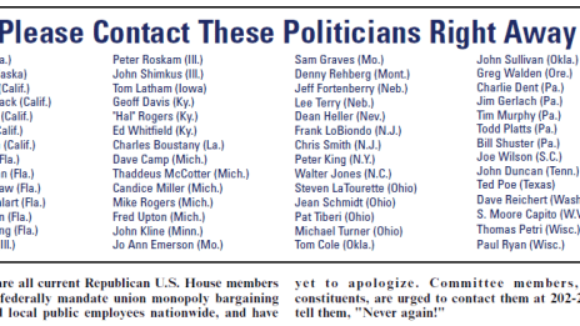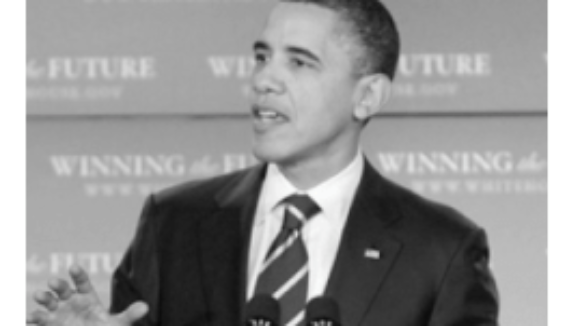Shocked? Not So Much
Stephen Lerner, the SEIU boss who left the union and now advocates economic war on the USA, is still on the payroll of the SEIU! Is anyone really shocked?…
Stephen Lerner, the SEIU boss who left the union and now advocates economic war on the USA, is still on the payroll of the SEIU! Is anyone really shocked?…
According to the March 29th Richard Rahn (Newsmax) article, Right to Work and Lower Taxes appear to deliver a one-two punch in states fights against unemployment and personal income decline. In fact, Right To Work states lead in economic prosperity and personal income growth. State Economic Climate Economic Performance Ranking 2010 Business Tax Climate Ranking 2011 Small Business Survival Ranking 2011 Population Growth 2000-2010 Right to Work Florida 5 5 6 17.6% Yes Virginia 8 12 14 13.0% Yes Tennessee 10 27 11 11.5% Yes Texas 19 13 3 20.6% Yes California 46 49 48 10.0% No New Jersey 48 48 50 4.5% No New York 50 50 49 2.1% No Sources: American Legislative Exchange Council, Tax Foundation, Small Business and Entrepreneurship Council, U.S. Census Bureau, National Right to Work Legal Defense Foundation. From Rahn's article: “Fiscal crisis hits the states” has become this year’s most boring and repetitive headline. But what is largely overlooked is that some states are doing relatively well — such as my home state of Virginia — and are, in fact, balancing their budgets without draconian budget cuts or tax increases. Given the ongoing fight between public-employee unions and some state governors, it is interesting to observe that the “right to work” states (that is, those states where workers are not forced to join a union against their will in order to obtain a specific job) also had much better performances than in those states where workers are not protected from involuntary unionism.

From RealClearPolitics by Michael Barone : “The 22 states with right-to-work laws grew 15 percent in the last decade. The other states grew just 6 percent. The 16 states where collective bargaining with public employees is not…

(Source: March 2011 NRTWC Newsletter) Time For Politicians in Both Parties to Own Up to Their Mistakes In late February, many concerned Americans in other states were paying close attention to the fierce, and still unresolved, battle over public-sector union monopoly bargaining in Wisconsin. Many observing the Madison showdown from their homes inwere undoubtedly amazed by what they saw. These five states, like roughly a dozen others, have no statutes on the books empowering government union officials to act as state and local public employees' monopoly-bargaining agents. When elected officials in such states make a judgment that a reform in public-employee compensation packages and work rules is necessary and can be prudently implemented to give taxpayers a better return on their money, they have the power to proceed. It is then up to the voting public to judge whether the reform was a good idea or not. In Wisconsin, however, like in other states which statutorily mandate union monopoly bargaining over public employee pay, benefits, and working conditions, elected officials from the governor on down have far less control over the roughly 50% of public expenditures that go into employee compensation. In the Badger State, half of state and local government employees are unionized. Elected officials and their appointees cannot make any significant changes in the way these employees are compensated or in how they are instructed to do their jobs without government union bosses' approval. Today, millions of Americans whose state and local governments operate free from Big Labor constraints appreciate, after watching the bitter struggle in Wisconsin unfold, better than ever before the importance of keeping union monopolists out of the government workplace. Only Intense Right to Work Lobbying Blocked Monopoly-Bargaining Bill What most freedom-loving Virginians, North Carolinians and Texans probably don't realize is that, just last year, the U.S. Congress came within a hair of taking away their prerogative to decide how their state and local government workplaces are run. At the outset of the 2009-2010 Congress, the votes were there to pass the so-called "Public Safety Employer-Employee Cooperation Act" in both the House and the Senate. Furthermore, President Obama was publicly vowing to sign this legislation as soon as it reached his desk. This measure, more accurately labeled the "Police/Fire Monopoly-Bargaining Bill," would have foisted Wisconsin-style labor relations on state and local public-safety departments in all 50 states.

Actuaries trying to accurately reflect the state of the California pension system were rebuffed by the CalPERS Board lead by Neal Johnson of the Service Employees International Union who told the Board it was better to hide…
Ex-SEIU union operative Steve Lerner, is pushing a plan to crash the economy and redistribute the wealth.
Ex-SEIU union operative Steve Lerner, is pushing a plan to crash the economy and redistribute the wealth.
Some bills making their way through the Florida legislature are striking fear into the union bosses in Florida because it threatens big labor’s access to the wallets of teachers. One bill would would bar any public union from automatically…

(Source: March 2011 NRTWC Newsletter) Labels Proposed Rollback of Union Monopoly Powers As an 'Assault' As the cover story of this Right to Work Newsletter edition reports, last month Wisconsin teacher union bosses encouraged educators in Madison, Milwaukee, and other school districts to strike illegally in order to participate in protests against GOP Gov. Scott Walker's monopoly-bargaining rollback proposal. Most teachers rejected union bosses' exhortations and reported for their jobs. However, the number of teachers who heeded the siren call of union militancy was sufficient to force multiple school districts, including Milwaukee's, to cancel classes. Madison's schools were closed for a total of four days. Many of the striking union militants, convinced that they should be paid for protesting rather than carrying out their assigned duties, collected phony "sick notes" from pro-forced unionism doctors. Wisconsin taxpayers may have to furnish these outlaw teachers with up to $6 million in "sick pay" for work they were perfectly capable of performing, but chose not to. Wisconsites quoted in media reports, including some who are normally sympathetic to Big Labor, are outraged by the actions of a relatively small share of Badger State teachers (in Milwaukee, for example, just a few more than 600 out of 5,400 teachers joined in the union-instigated "sickout"). Former Union Czar Andy Stern: President's Statement 'Helped Enormously' Even as they were losing the good will of the people of Wisconsin, however, teacher union zealots and thousands of other government union radicals who joined in their wildcat strikes got a "thumbs up" from the White House. On February 17, the second day of illegal teacher strikes, President Obama took the extraordinary step of inviting a reporter and camera crew from a Milwaukee TV station to sit down with him at the White House for an interview. Mr. Obama suggested he was okay with the portions of Gov. Walker's reform package that authorize public agencies to divert a significantly higher share of employees' wages and salaries into their health care and pension plans, and thus reduce taxpayers' total compensation liabilities. At the same time, the President blasted the provision that would, for the first time in decades, restore for most Wisconsin public employees the Right to Work without being fired for refusal to pay dues or fees to an unwanted union.